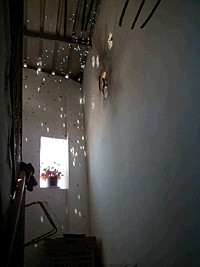|
The photographs I didn't take
The two men coming towards me carried a red and blue sport bag between them. It was a little bit more than one meter long, maybe containing a child of six to eight years old, or maybe parts of a grown up blown in pieces by a mine that the soldiers left at the front door before they left. It was not merely buildings that had been demolished; what I was walking on were the remains of people's homes. I had the camera in my hand, but my arm felt too heavy to lift it up.
I met the two men with the bag when I for the first time entered the area in Jenin called 'The camp' or Mujaham in Arabic because the inhabitants were moved there in 1948 from Haifa. To witness is important, and to document the images of the destruction screened in media, the mounds of the remains of entire apartment blocks, gigantic holes being dug in search of bodies, maybe someone is still alive, the work is heavy but orderly, everyone is helping out.
The soldiers entered Jenin on the second of April and stayed for thirteen days. They occupied the homes.
Each of these bodies was a person with family and friends. Mass destruction becomes abstract numbers of dead when shown on the TV screen, but also when one comes as a volunteer and tries, somehow, to help. One does ones job and in the meantime our eyes meet, seeing in the gaze of each and every one a story of humiliation, pride, sorrow, strength, courage and underneath all this a hopelessness one just doesn't speak about. One exists, they exist, we exist, and who are we?
I am not fit to take pictures of this, I think when I walk on. Akram shows me around. 'Celil what do you say?' he asks again and again. I pick up the camera, take my pictures, it is my protection. I look, but cannot understand. It is each of these pairs of eye that should take these pictures, tell their story, what to do? I hear a child behind me, I turn around, and the father picks up his child who starts to cry. I hear it in my chest. I take up my camera again; the air is so dry, smoky with dust.
For three days we visit the outer area where people live in what remains of their houses. They tell us about how the soldiers have been living in their house, how they had their men stand undressed with tied hands, how the soldiers peed and shat in their cooking pans, sprayed the star of David on the walls and wrote words in Hebrew that they couldn't read. "This is our land, we are going to set it on fire," it says on one wall.
They kept telling their children that it would be over soon - tomorrow, tomorrow. When we, several days later, tell a 'refusenik', a soldier that refuses to be on duty in the occupied areas, about the bedroom being the most desecrated room in every house, he says he doesn't think that those were given orders, but an unconscious action. That is where the children are made.
50 000 people live in greater Jenin. It is a fertile area, a granary of sorts, producing enough grain also for Gaza. Jenin means 'The beautiful garden'. The city is now surrounded by 'settlements'. The river that used wind its way through the city was redirected 1967 to water the settlers farms. 'Settlements' is another type of occupation. But it is not just the occupied land people talk to us about - it is, as a man tells me, a psychological occupation as well, since ones mind is constantly concerned with how to handle checkpoints, the control of export, the control of water, the control of telephone and communications. So much time is spent finding ways and means of managing everyday life and catastrophes. Every human being needs space in which to think, develop and create something new, to build visions. A man speaks about how he longs for chatting to his friends about something else than how they are going to repair what was destroyed yesterday and what they could have had if things had been different.
We also talk about the suicide bombers and someone says, 'We have to find the reason, the cause of such an action. I can reach this limit too, in my mind, and it scares me.'
Cecilia Parsberg, Visual artist
|

Bullet holes. |

